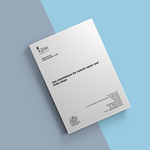IGEM/UP/18 - Gas installations for vehicle repair and body shops

This standard covers gas fired appliances using normally distributed gases such as natural gas and liquefied petroleum gas. It covers the design, installation, use and maintenance of gas fired appliances in vehicle repair and body shops. Specifically it contains details of:
- Legal considerations such as Gas Safety (Installation and Use) Regulations
- Safety
- Requirements for gas appliances
- Gas and Fire Detection and Hazardous Areas.
Introduction
1.1 This Standard supersedes British Gas IM/28, Gas Appliances in Garage
Workshops, which is obsolete.
IM/28 had been published because over the years there had been a series of fatal accidents and serious injuries arising from the uncontrolled release of petroleum in garage workshops. To control this hazard various bodies had issued guidance which was also referenced in this document.
A review has been undertaken of IM/28 and the main content included in IGEM/UP/18 along with the latest industry information related to gas installations in industrial and commercial premises.
1.2 This Standard has been drafted by a Panel appointed by the Institution of Gas Engineers and Manager’s (IGEM’s) Gas Utilization Committee and is published by the authority of the Council of IGEM.
1.3 This Standard is intended for use by those concerned with the design, installation, use and maintenance of gas appliances and equipment in vehicle repair and body shops where flammable products may be stored or in use.
1.4 This Standard reflects current best practice. As a general principle, this Standard does not duplicate national/international legislation or standards. However, where appropriate, additional guidance, interpretation and clarification have been provided. Applicable references for legislation, standards, etc. are listed in Appendix 2.
1.5 This Standard makes use of the terms “must”, “shall” and “should” when prescribing particular requirements. Notwithstanding Sub-Section 1.8:
- the term “must” identifies a requirement by law in Great Britain (GB) at the time of publication
- the term “shall” prescribes a procedure which, it is intended, will be complied with in full and without deviation
- the term “should” prescribes a procedure which, it is intended, will be complied with unless, after prior consideration, deviation is considered to be acceptable.
Such terms may have different meanings when used in legislation, or Health and Safety Executive (HSE) Approved Code of Practice (ACoPs) or guidance, and reference needs to be made to such statutory legislation or official guidance for information on legal obligations.
1.6 It is now widely accepted that the majority of accidents in industry are in some measure attributable to human as well as technical factors in the sense that actions by people initiated or contributed to the accidents, or people might have acted better to avert them.
It is therefore necessary to give proper consideration to the management of these human factors and the control of risk. To assist in this, it is recommended that due regard be paid to HSG48.
1.7 The primary responsibility for compliance with legal duties rests with the employer. The fact that certain employees, for example, “responsible engineers”, are allowed to exercise their professional judgement does not allow employers to abrogate their responsibilities. Employers must:
- have done everything to ensure, as far as is reasonably practicable, that there are no better protective measures that can be taken other than relying on the exercise of professional judgement
- have done everything to ensure, so far as is reasonably practicable, that “responsible engineers” have the skills, training, experience and personal qualities necessary for the proper exercise of professional judgement
- have systems and procedures in place to ensure that the exercise of professional judgement by “responsible engineers” is subject to appropriate monitoring and review
- not require “responsible engineers” to undertake tasks which would necessitate the exercise of professional judgement that is beyond their competence. There should be written procedures defining the extent to which “responsible engineers” can exercise their judgement. When “responsible engineers” are asked to undertake tasks which deviate from this, they should refer the matter for higher review.
1.8 Notwithstanding Sub-Section 1.5, this Standard does not attempt to make the use of any method or specification obligatory against the judgement of the responsible engineer. Where new and better techniques are developed and proved, they should be adopted without waiting for modification to this Standard. Amendments to this Standard will be issued when necessary, and their publication will be announced in the Journal of IGEM and other publications as appropriate.
1.9 Requests for interpretation of this Standard in relation to matters within their scope, but not precisely covered by the current text, should be addressed to Technical Services, IGEM, IGEM House, High Street, Kegworth, Derbyshire, DE74 2DA and will be submitted to the relevant Committee for consideration and advice, but in the context that the final responsibility is that of the engineer concerned. If any advice is given by, or on behalf of IGEM, this does not relieve the responsible engineer of any of his or her obligations.
1.10 This Standard was published in March 2012.
Scope
2.1 This Standard covers gas fired appliances using normally distributed gases such as Natural Gas (NG) and liquefied petroleum gas (LPG). It may be relevant to other fuels such as LPG/Air.
Note: Information on oil fired systems can be found in BS 5410.
2.2 This Standard covers the design, installation, use and maintenance of gas fired appliances in vehicle repair and body shops.
Note 1: Additional considerations may be required if the premises also dispense vehicle fuel(s). For further advice consult the fuel supplier or see Energy Institute’s code of practice IP MCSP P15.
Note 2: This Standard does not cover vehicle and body shops which work on compressed Natural Gas (CNG) vehicles.
2.3 Italicised text is informative and does not represent formal requirements.
2.4 Appendices are informative and do not represent formal requirements unless specifically referenced in the main sections via the prescriptive terms “must” “shall”, or “should”.
